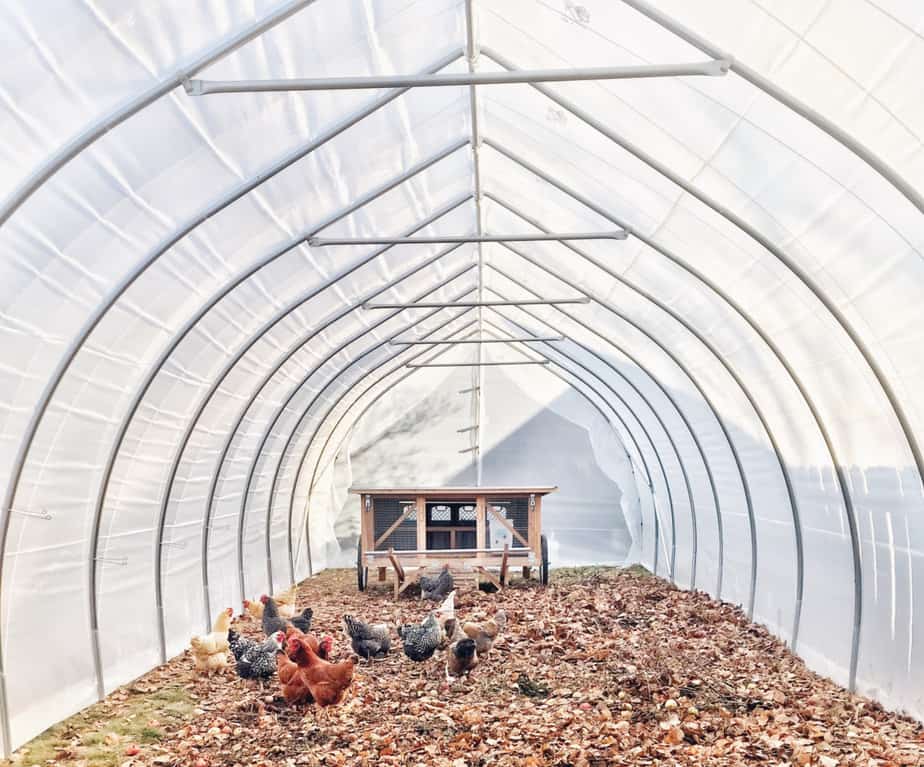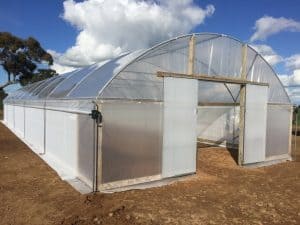As you keep expanding on your garden and greenhouse dreams, you may consider adding chickens to your backyard homestead. Chickens are one of the most rewarding and beneficial possible next steps.
In fact, introducing chickens in your greenhouse setup is a fantastic option for several reasons.
Chickens and your greenhouse are a more natural combination than you may think: after all, chickens need shelter, and greenhouses need heat!
Combining chickens and greenhouses is sometimes considered a permaculture or regenerative agriculture “holy grail”—an idealistic combo that can be tricky to pull off but incredibly beneficial when done right.
While it does indeed take a bit of time, attention, and perhaps even upgrading your greenhouse, keeping chickens in your greenhouse can be a win-win.
The Benefits Of Keeping Chickens In Your Greenhouse
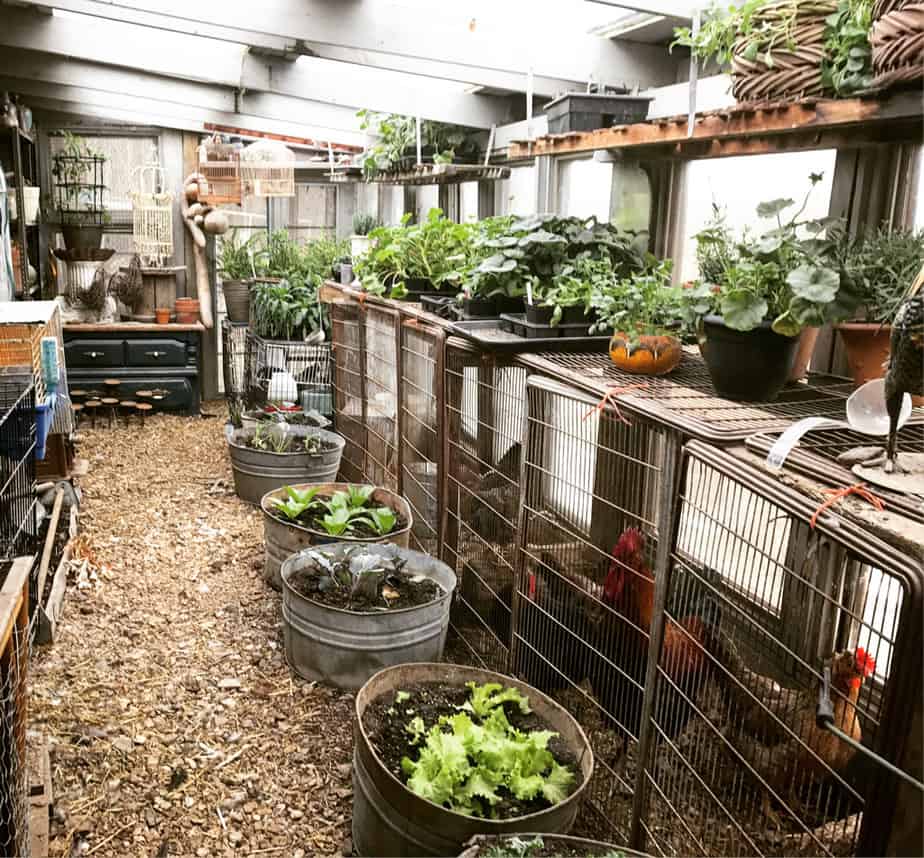
Chickens in your greenhouse is so doable you may even consider raising them from an egg!
Warmth For Plants
Body heat from your feathered friends will help keep cold snaps and frost away from your greenhouse without (or, at least, with less) artificial heating.
Shelter for Chickens
Chickens need a place to sleep, roost, stay warm, lay eggs, and stay safe from predators like raccoons and coyotes. If you’re planning to keep chickens, you’ll need some sort of housing for them. Why not double the uses for your cozy greenhouse and invite the chickens in?
Pest Control
It’s not a cure-all, but chickens can help control and prevent pests and diseases in your greenhouse.
Chickens eat bugs! They love to munch on pesky insects and slugs that might make their way to your crops or otherwise infect your greenhouse.
Carbon dioxide/oxygen exchange
Plants use carbon dioxide during photosynthesis to create their own “food,” releasing oxygen back into the atmosphere.
Chickens, as you know, need oxygen to live and release carbon dioxide (just like we do)! This symbiotic relationship is what makes animals’ connection to plants so special, and you can create a little microcosm of our hospitable atmospheric conditions in your greenhouse.
Chicken Manure = Compost Material
Chicken droppings can create an incredibly rich soil supplement.
Remember that straight chicken manure is not good for plants—don’t plant crops in soil that has been in contact with chicken droppings, and don’t spread “raw” chicken manure on your plants. Chicken droppings must be fully composted before they can be used in contact with plants.
Chickens = Composters
What’s more, you can feed your chickens kitchen scraps and over-the-hill veggies and fruits to save your food waste from landfills! It’s a win-win-win for you, your chickens, and the planet. (Add one more win if you turn that manure into compost for your garden.)
Interested in what you can grow in your greenhouse? Check out our guide to the best beginner greenhouse plants!
Fresh Eggs
Enough said!
Protecting Your Plants From Your Chickens
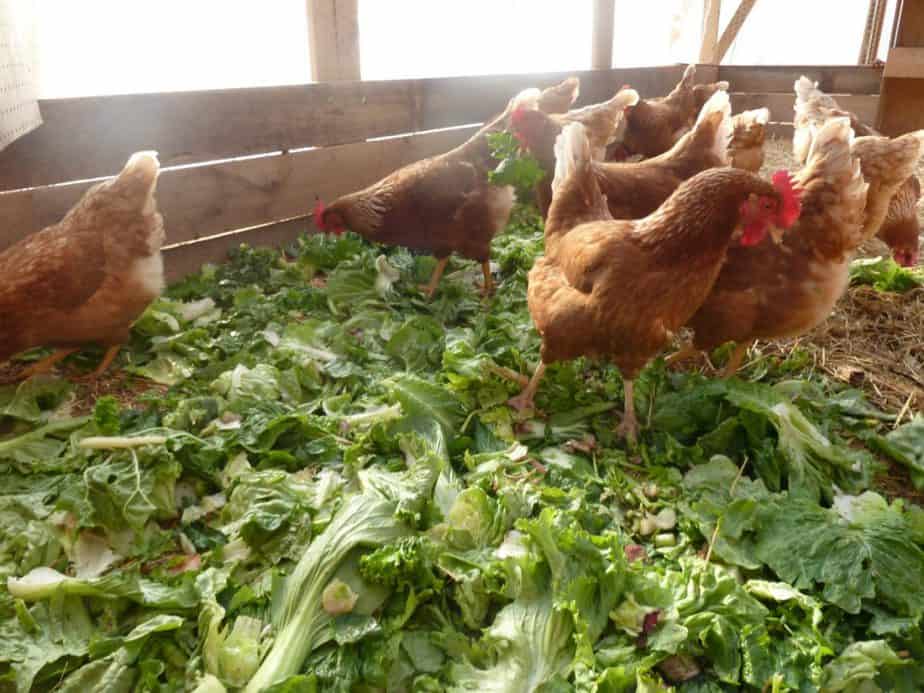
If you’ve already started thinking, “Wait, won’t chickens eat my greenhouse plants?” you’re already one step ahead of us.
Chickens are smarter than most of us would think, but they’re not too picky about food. They won’t bother your larger plants like perennials, trees, shrubs, or berry bushes (without ripe berries!). But your more delicate plants—which you likely keep in the greenhouse—need some barriers to protect against chickens.
Even though chickens don’t prefer to eat those plants, their soil-scratching and grub-rooting habits can damage delicate and viney plants with tender roots.
The easiest way to protect your greenhouse plants from chickens is to use chicken wire around the plants. You might also place a wooden barrier, perhaps made from reclaimed wood pallets, to form a fence to separate chickens and plants in your greenhouse.
Basic Needs For Chickens In Your Greenhouse
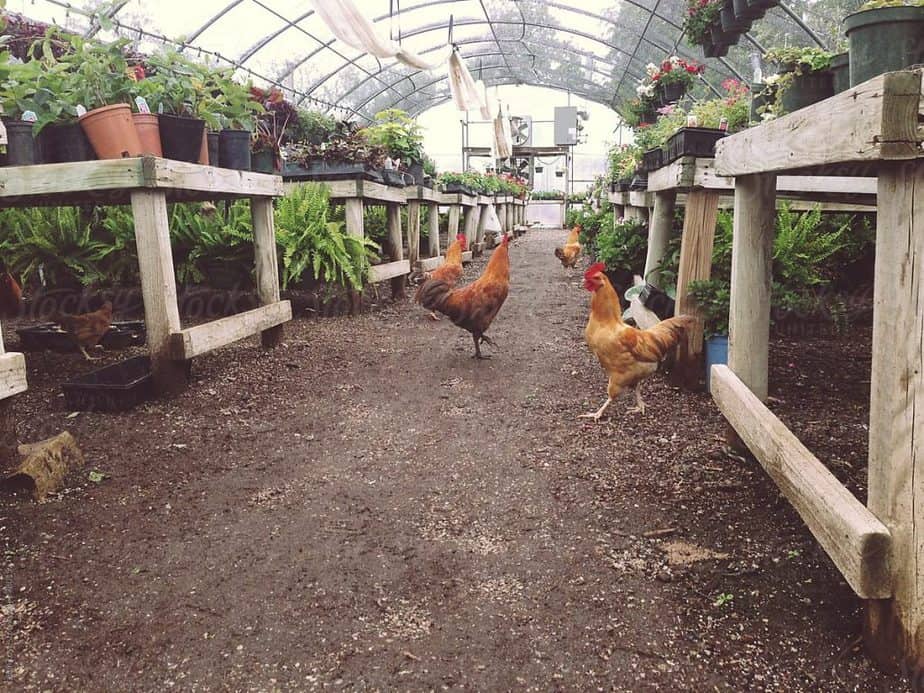
The Essentials
Water
Chickens need lots of water. Give them a few places to drink water, including a poultry foundation.
If your outdoor space is big enough and suits it, digging a small trough for “groundwater” is a great idea to keep chickens hydrated, cool, and happy, too.
Dust and Dirt
Chickens like to roll around in dirt, hay, soil, and the like to clean themselves and keep themselves cool. The floor of this house should be organic matter.
Food
Chickens need plenty of food, and they like to scratch for it. They’ll eat kitchen scraps, grain, seed, bugs, and just about anything else they scratch at.
Roosts
Chickens need a place to rest, sleep, and stay warm. The roost is just that place! Roost can be ladders, tree branches, primitive shelves, or even baskets.
Roosts should be at least a couple of feet off the ground so that chickens feel safe and can stay warm, but not so high that they can’t jump to the roost.
Remember, these birds don’t fly.
Nesting Boxes
Provide your hens with a place to lay their eggs that is separate from their roosts. Yes, sometimes you’ll see chickens roosting in a nesting box, but it’s ideal for hens to have a cozy place for laying.
Access To Outdoors
Never sequester your chicken inside your greenhouse without access to the world outside! Chickens aren’t meant to live in a completely enclosed space. Your chickens will become extremely unhappy, and the environment inside your greenhouse won’t be hospitable to plants (or humans) if you don’t allow your birds access to the outdoors.
The best way to give your chickens easy outside access is by using plastic sheeting that can roll up to release heat.
Temperature and Climate
Roll-up plastic walls on a greenhouse provide a two-fold solution: access to the outdoors for your chickens and ventilation for your greenhouse.
Just like your plants, chickens are sensitive to temperature. Remember, birds are cold-blooded, so they’re probably much less sensitive to cold than your greenhouse plants! Too hot or too cold, and your chickens will become distressed and can even die.
It’s best to keep them in greenhouses with a maximum temperature in the mid-80s (Fahrenheit) and humidity that you feel comfortable breathing in. If you’re growing plants that need a very high temperature or high humidity, like some rare tropical plants, adding chickens to your greenhouse setup is not a good idea.
Consider a humidifier or a dehumidifier depending on your humidty levels.
Always give your chickens access to the outdoors so they can choose where to hang out. They’re hardier (and smarter!) than you think—particularly in cold weather.
Be sure to also give your chickens an open door, a nice breeze, and some shade in the greenhouse, and they’ll do fine in hot weather.
Keeping It (Relatively) Clean
Some other common questions: Won’t the floor be disgusting?! Is their manure bad for the plants or humans?
Yes, chickens poop a lot.
Yes, it will get all over your greenhouse floor.
That’s why the floor of your chicken-greenhouse combo will need to be thick layered dirt, hay, or softwood chips, instead of a more slick surface like cement or brick.
Because chicken manure is high in ammonia, it can be dangerous for certain plants in high quantities. (And if you’ve ever kept chickens before, you know it always comes in high quantities.) It can also be detrimental to human health.
But don’t worry, if you regularly rake, turn, or till the floor beneath the chickens. Use organic matter like hay, grass, and/or soil for the floor/bedding below the chickens’ habitat to start creating your own compost.
Air Circulation
Good air circulation and ventilation are essential in any greenhouse, and it’s imperative in a greenhouse where chickens reside.
Read much more about creating perfect airflow in your greenhouse in our Greenhouse Cooling and Ventilation Guide.
Quick Tips For Chickens In Greenhouses
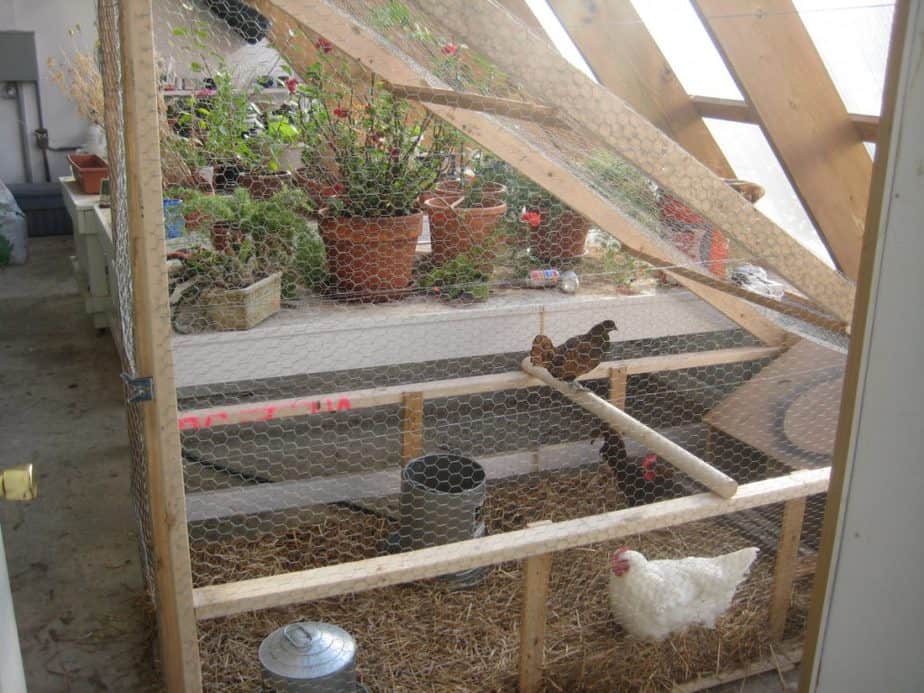
- Avoid overcrowding. A small number of chickens is best. If manure builds up too quickly, chickens are sleeping on the floor, or the smell is unbearable, it’s too crowded.
- Always provide shade inside the greenhouse. Read more about shading your greenhouse simply and cost-effectively.
- Protect your greenhouse’s plastic sheeting by placing a barrier at least six inches from the greenhouse wall—on the inside, and, if chickens are able to access the exterior walls, on the outside as well. This will prevent chickens from scratching for pecking the plastic.

